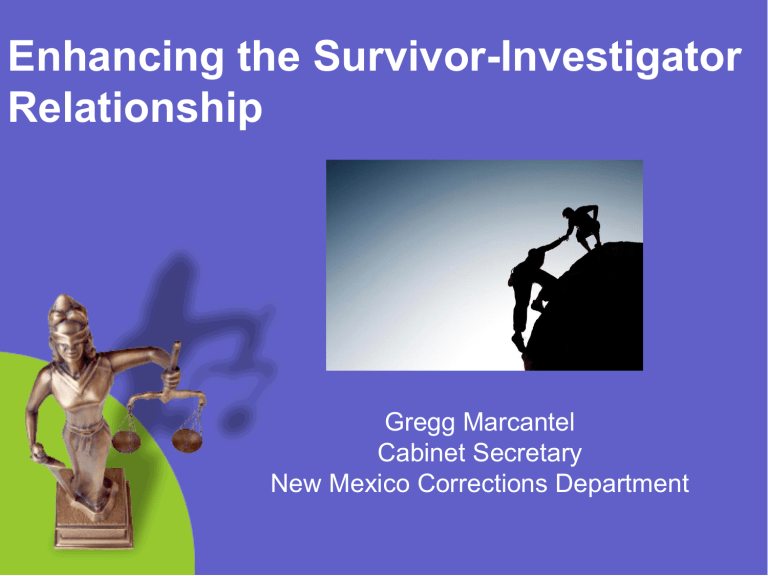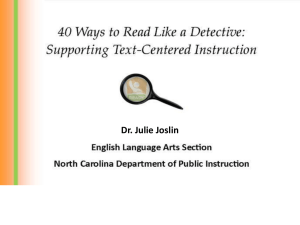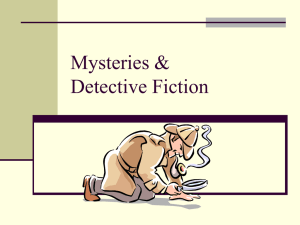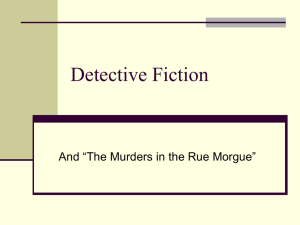T1 Collaborating for Justice

Enhancing the Survivor-Investigator
Relationship
Gregg Marcantel
Cabinet Secretary
New Mexico Corrections Department
Opening Discussion
What are the typical goals and objectives for a survivor during a criminal investigation?
What are the typical goals and objectives for the detective during a complex criminal investigation?
During the investigation and adjudication of a criminal offense, who is the focus?
What are the obvious obstacles that typically exist between a criminal investigator and crime survivors?
The Realities of Our Roles
1. More than even the successful conclusion of the investigation, a survivor or victim of crime seeks the dignity of engagement.
As a victim of crime, we feel violated and lack a sense of control in our life.
To feel dignity, we must feel as though we matter!
The Realities of Our Roles
2. The detective, having generally acquired some level of law enforcement experience before attaining the position, is employed in a profession in which people look to he/she for answers…to gain control of matters when chaos looms.
Running toward danger when everyone else has the luxury of running away from it!
The Detective
The detective who consistently solves the most difficult and bizarre cases is often said to be “lucky”.
While luck often plays a role, luck is equally made.
The “lucky” detective often possesses, in addition to adequate preparation, other qualities.
Essential Qualities of a Successful Detective
High degree of self-discipline
It’s not the presence or absence of others that regulate successful investigators, rather internalized control.
Thoroughness
Alert, fastidious attention to detail.
Sound, logical reasoning for systematic inquiry
The fact that a particular step(s) during investigation are rarely productive does not mean they should be omitted.
Initiative/Resourcefulness
Objectivity and freedom from pre-conceived biases
The successful detective is a hunter…a predator!
The Realities of Our Roles
3. The criminal justice system is a lonely place for survivors and victims of crime.
• A void exists between the time the matter is being investigated and the adjudication, as it relates to advocacy services.
• The system is geared for an emphasis upon the offender and often the victim’s needs and perspectives is lost.
The History of Policing
The Professional Policing Era and
Its Effects on Crime Victim
Relationships
Three Eras of Policing in America
The Political Era (1840-1930)
The Reform Era (1930-1980)
The Community Era (1980 -Present)
The Political Era
The Political Era was characterized by:
Police authority drawn from politicians and law
A broad range of social service functions
Decentralized organization
An intimate relationship with the community
Extensive use of foot patrol
Corruption was common based on close the ties between police and politics.
The Spoils System(Motto: “To the victor goes the spoils”) Resulted in the political interference with police as prevailing political party sought immunity and special privilege with police.
The Reform Era
The Reform Era resulted from a reaction to the corruption of Political Era and was characterized by:
Police authority drawn from law and professionalism
Crime control as a primary function
Centralized and efficient organization
A professional remoteness from the community
Preventative motorized patrol and rapid response to crime
A.O. Wilson was considered the main architect of the Reform Era and coined a style of policing known as the Professional Model that followed the characterizations of the Reform Era.
The Community Era
Following changes in corporate America, many law enforcement agencies became customer-oriented, viewing citizens as consumers of police services. Law enforcement during the Community Era is characterized by:
Police authority drawn from community support
Law and professionalism
A broad range of social service functions, including crime control
Decentralized organization with greater authority provided to line officers
An intimate relationship with the community
The use of foot patrol
A problem-solving approach
Perceptions are Realities
Based on the often differing experiences and perspectives for the detective and the survivor, a number of considerations should be appreciated.
The Burden of Proof
The Rules of Evidence
The nature of our reasoning as human beings.
The Rules of Evidence
Anything can be evidence. Therefore it becomes important to understand that anything is admissible as evidence unless there is some rule to exclude it.
0%
0%
Admissible under the
NM Rules of Evidence
All of the evidence as we know it
100%
The Burden of Proof
We must remember the difference between
Probable Cause and Proof Beyond a Reasonable
Doubt.
Proof Continuum
0%
0%
Probable Cause 33.3%
50% 100%
Proof Beyond a Reasonable Doubt 89.9%
The General Nature of Human Reasoning
From the crime victim to the street cop, to the prosecutor and defense attorneys, to the judge and individual juror, the entire criminal justice system is influenced by human reasoning.
Based on the critical role of decisions made in the courtroom, interest in forensic and legal issues has stimulated a focus on the processes of reasoning by judicial decision-makers.
A working knowledge of the most common human reasoning errors may also allow both the detective and the survivor to avoid overpersonalizing issues that arise between their relationship .
Confirmation Bias
(
Positive and Negative Evidence)
Perhaps the most widely accepted error revealed in research associated with human reasoning is the notion that human beings have an inclination to seek information considered consistent with their current beliefs and tentative assumptions, while resisting consideration of potentially falsifying evidence.
Numerous laboratory experiments reveal that study participants often fail to discover general rules when required to seek relevant evidence, based on a general tendency to adopt strategies designed to confirm rather than dispute their hypotheses.
We are at greatest risk of falling prey to this reasoning error when we are overwhelmed and emotional.
Confirmation Bias and the Survivor/Detective Relationship
Mock jury research has investigated the affect of our preconceptions of legal principles on decisions made within the criminal justice system. More recent and relevant research has revealed most citizens to report naïve descriptions of the elements of crimes such as robbery and kidnapping that were often inconsistent with the definitive legal elements of these crimes.
Our Take Away
As the result of an inaccurate appreciation of the elements of a crime in question, we may be inclined to attach more significance to evidence in support of our own notions of the what constitutes the crime.
In instances whereby the definitive legal elements of a crime are in strong contrast to our preconceived notions, bias may then swing toward conflict between the detective and the survivor.
CASE EXAMPLE
Fundamental Attribution Error
Examination of the defendant’s intent to commit the criminal act in question will be the fundamental basis of inquiry of the criminal justice system. When attempting to probe evidence of possible guilt of an individual, inquiries generally focus on why the defendant may have committed the illegal act.
Judgments regarding why individuals acted in a certain way are often referred to in psychological research as attributions .
Dispositional and Situational
Classifications
Dispositional attributions are defined as judgments that refer to relatively stable characteristics of the individual whose behavior is described in the attribution.
On the other hand, situational attributions are defined as judgments that are based on the particular circumstances of the situation at the time the behavior occurred.
Fundamental Attribution Error and the Survivor/Detective Relationship
A personal example of Fundamental
Attribution Error
When considering decisions and actions of either the investigator or the survivor, might we then be predisposed to assigning our conclusion about the character (rather than the situation) when we don’t see things in the same way?
Hindsight Bias
The defendant’s actions are likely to be closely examined by surviving family and key criminal justice decision-makers.
Additionally, the actions of law enforcement and witnesses will be a likely source of interest by these same folks.
In both criminal and civil legal settings, decisions are often made concerning the degree by which the behavior or actions of an individual or group may have been justified, through a historical view of the event in question.
Hindsight Bias and the Courtroom
There are many research examples that tend to illustrate the effect of outcome knowledge on criminal justice decisions.
In the study scenario, law enforcement personnel had been provided information regarding criminal activity at a specific location. Upon arrival to the location in question, the suspected perpetrator of the criminal activity refused the investigating officers access onto the property. Based on forced entry by the investigating officers, the property in question was damaged.
The experiment included three groups of study participants that were organized individually as mock juries with the responsibility of deciding whether or not law enforcement was responsible for the sustained damage to the property.
The first juror group was provided a positive outcome, in that the investigating officers had discovered evidence supporting illegal activity.
The second juror group was provided a negative outcome, whereby no evidence of illegal activity was detected by the investigating officers.
The third juror group was provided no information relating to the outcome of the law enforcement investigation following the forced entry onto the property.
Hindsight Bias and the
Survivor/Investigator Relationship
The investigator’s commitment to a case based on previous choices made by the victim.
Low risk lifestyle
High risk lifestyle
The survivor’s disadvantage of hindsight.
Survivor guilt?
The Solutions?
Trust
Trust and Transparency
The relationship between the detective and the survivor is complex and seeks to navigate safely through high stakes issues, differing perceptions, and strong emotions.
• The relationship demands transparency.
• Once trust is breached, we must expect (not be surprised by) a compromise of the relationship.
Trust and Communication
The single greatest barrier in communication may be our assumptions that it is occurring!
Based upon the complexities that define the survivor/detective relationship, there can be no such thing as over-communication.
The root cause of many, if not most of human problems lies in how people behave when dealing with high stakes, emotional issues.
Crucial
Communication
High Stakes
The Reality?
When the stakes are high…when our perspectives vary…when emotions start to run strong, even casual communication can transform into crucial communication.
Ironically, the more crucial our communication may be, the less likely we are to handle it well.
The consequences for either avoiding crucial communication or fouling it up for the detective or survivor are severe.
When we fail to communicate, every aspect of each of the lives of the detective or survivor can be affected.
The good news? As we learn how to step up to the crucial communication required for this relationship, virtually every other domain of our lives will be positively influenced.
So how do we typically handle the necessary critical communication required for a healthy detective/survivor relationship?
In truth, when we face difficult conversations, we can do one of three things:
We avoid them;
We can face them but handle them poorly, or;
We can face them and handle them well.
The Audacious Claim
Strong detective/survivor relationships…for that matter, strong careers, strong organizations, even strong communities all draw from the same source of power – an ability to talk openly about high stakes, emotional, and controversial topics.
The Crucial Communication Take Aways for the Detective and Survivor
At the heart of almost all the problems I’ve experienced in my relationships with survivors lie crucial communication that I was either not having or not holding well.
The Fool’s Choice
The mistake most of us make when contemplating unpleasant but crucial conversations is we believe that we have to choose between telling the difficult truth and keeping the relationship together.
Dialogue
When it comes to risky conversations, skilled people find a way to get the relevant information out in the open.
At the core of every successful conversation lies a free flow of information.
To put a label on this particular talent – it is called DIALOGUE
Pools of Meaning
Each of us enters the investigation in different ways.
The detective chooses to; while;
The survivor more often does not.
At the intersection that the detective and survivor meet, each enters the relationship and any communication to follow with their own feelings, biases, theories, and experiences relating to the case.
This unique combination of thoughts and feelings make up the individual pools of meaning for the detective and survivor each.
Our pools of meaning not only informs us but our every action.
But remember, when the detective and survivor enter the relationship, they DON’T share the same pools of meaning
We must remind ourselves that our conclusions are subjective. When we feel strongly about matters, or conclusions feel like fact, but they’re not.
People who are skilled at dialogue do their best to make it safe for everyone to add their own meaning to a shared pool – even when at first glance one or the other may be at odds with the idea or belief.
As a shared pool of meaning grows, it helps both the detective and survivor in 2 primary ways:
1.
As each are exposed to more relevant information, better choices are made and trust is built.
In a very real sense, the shared pool of meaning is a measure of the IQ for the detective and survivor.
2.
Since the meaning is shared, both the detective and survivor willingly act on whatever decisions are made in the case – with both unity and conviction.
Summary
Focus on the Heart
Your own heart, regardless which role you are in.
If you can’t get yourself right, you’ll have a hard time getting the relationship right.
When our relationships become strained, the problem is NOT that our behavior degenerates, it’s that our motives do!
Starting with the heart means that we start and maintain the detective/survivor relationship with the right motives and stay focused, avoiding the
Fool’s Choice, no matter how difficult matters may become.
What do we want out of the relationship?
What do we NOT want out of the relationship?
A Personal Conclusion
Considering my professional experiences, when I think of the successful detective/survivor relationship, I think of the families of Kevin Shirley, Matthew Hunt, and Luis
Garcia…Jim and Rita McGrane.
I think of what their attitudes have taught me more than the work itself.
I think of the blessing and opportunity to have walked along side them to make a difference doing something important.
These relationships didn’t began the moment my work on their case began…it began with heart and attitude.
The relationships were sustained by the mutual desire to lift one another up…the desire to add value to each other .
When the case was completed, we were stronger and more successful human beings than had we been in the race alone.
My observation?
The strength of my heart is as important than the strength of my work skill.







